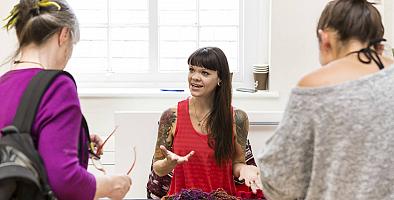Course information
Department
Length
Modular
Course overview
Support the professional learning of others through leadership in education, supervision and reflective practice.
Newly developed post-qualifying social work CPD programme
Goldsmiths’ social work team is recognised for its provision of excellent continuous professional development (CPD) for social workers. We are part of the Department for Education (DfE) funded Consortium led by Research in Practice (RiP) to develop and deliver a national Practice Supervisor Development Programme.
The outstanding quality of our social work programmes was recognised in 2015 when Goldsmiths, in collaboration with Royal Borough of Greenwich, the London Borough of Southwark and the London Borough of Lewisham, became a Social Work Teaching Partnership (SWTP) early adopter site, one of only four in the country. Since then we have developed this new programme for qualified social workers who want to develop their professional leadership in line with the revised Professional Capabilities Framework (PCF):
"We act and show leadership, individually and collectively, through promoting social work’s purpose, practices and impact. We achieve this through activities such as: advancing practice; supervising; educating others; research; evaluation; using innovation and creativity; writing; presenting; using social media; being active in professional networks and bodies; influencing; challenging; contributing to policy; taking formal leadership/ management roles. We promote organisational contexts conducive to good practice and learning. We work in partnership with people who use services and stakeholders in developing our leadership and aims for the profession."
– The British Association of Social Workers (BASW), 2018
Why study with us?
- The MA-level Social Work CPD modules support flexible and modular professional development across three pathways: Direct Practice, Practice Education and Management.
- We recognise that much of learning takes place in the workplace. All modules fully integrate practice with relevant theory/research and values.
- We believe in strength in diversity and our teaching, lecturers, participants and experts by experience reflect this.
- Participants can gain academic credit for developing their capability through work-based activities in either direct social work practice, practice education or management roles.
- Access to university facilities, library and resources on and off campus.
All modules on the post-qualifying MA programme align with career development, from initial consolidation and early professional development to supporting social work students on placement (Practice Educator), to becoming a Practice Supervisor or Practice Development Educator. In essence, the modules support the enhancement of practice relevant to participants’ roles with a focus on professional leadership as defined by the PCF and are aligned with the different Knowledge and Skills Statements (KSS) for both Child and Family and Adult Social Work. Download our diagram outlining the different leadership pathways (PDF) for more information.
Staff
Find out about the staff currently teaching in the Department of Social, Therapeutic and Community Studies.
Contact the department
If you have specific questions about the degree, contact Rebecca Donnellan.





